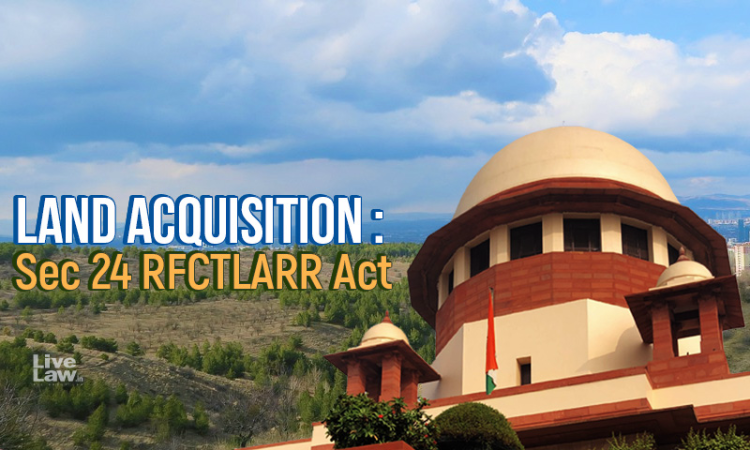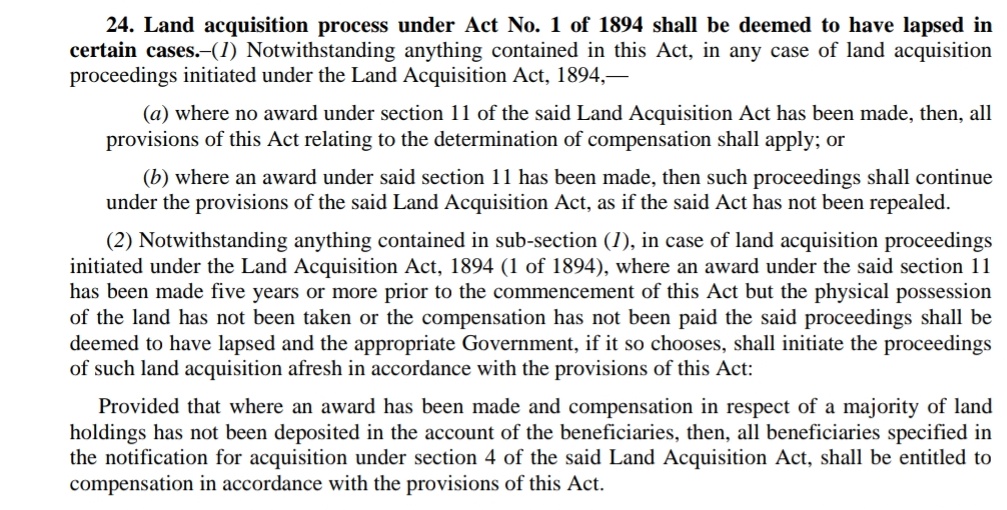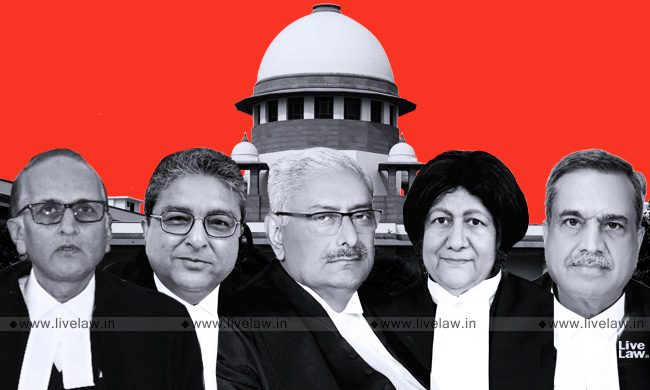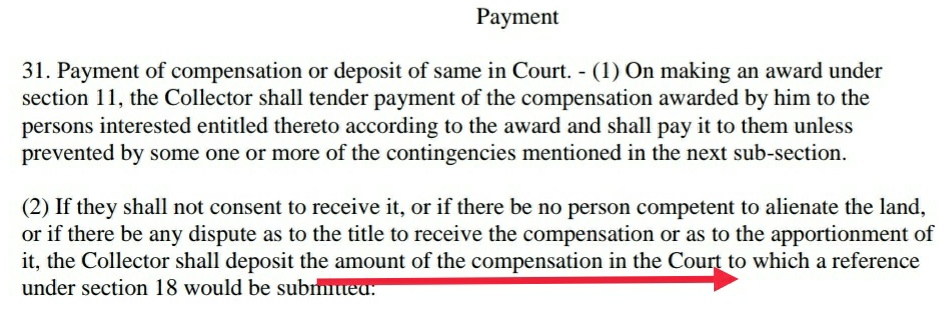Land Acquisition Judgment : Puzzling Questions Left By A Strained Interpretation
Manu Sebastian
15 March 2020 9:01 AM IST

The SC has done to Section 24(2) what the unsuccessful 2015 Amendment Bill intended to do to it.
Through its judgment in the case Indore Development Authority vs Manoharlal & others, the Constitution Bench of the Supreme Court has brought to life the once aborted attempt of the Central Government to amend Section 24(2) of the new land acquisition law.
The interpretation given by the Court to this provision of the Right to Fair Compensation and Transparency in Land Acquisition Rehabilitation and Resettlement Act 2013 (RFCTLARR) reflects the very same meaning which the Centre attempted to give to it by amending the same. In 2015, the Centre proposed to introduce a host of changes to the Act, first by bringing an Ordinance, which was followed by a Bill introduced in the Parliament. But the Centre had to face strong opposition from several quarters, including farmer groups, who alleged that the Government was trying to dilute the beneficial provisions of the law.
Section 24 is a transitory provision, which talks about the impact of the RFCTLARR Act on the proceedings pending under the Land Acquisition Act 1894. Section 24(1) says that where no award has been passed under the old act, the land owner will be entitled to the benefits of the new act, and where award has been passed, the proceedings under the old law will remain unaffacted.
Section 24(2), which overrides Section 24(1), states that where award has been passed five years or more prior to the commencement of the new act(i.e before January 1, 2009), the proceedings under the old act will lapse if :
- possession has not been taken ,or
- compensation has not been paid.
While the plain text of the provision used the word 'or' in between the above two conditions, the Court has now interpreted "or" to be "and/nor" to state that both these eventualities must happen to cause the lapse (more on this in the later part of this article).

The RFCTLARR (Amendment) Bill 2015 sought to introduce the following proviso to Section 24(2) :
"Provided further that in computing the period referred to in this sub-section, any period or periods during which the proceedings for acquisition of the land were held up on account of any stay or injunction issued by any court or the period specified in the award of a Tribunal for taking possession or such period where possession has been taken but the compensation is lying deposited in a court or in any designated account maintained for this purpose shall be excluded.".
In plain words, this amendment sought to state the following :
- There will be no lapse of proceedings under old act, if possession was not taken due to orders of stay or injunction passed by any court.
- If compensation has been deposited in treasury accounts in cases where land owners refuse to receive the same, such deposit will count as payment of compensation.
There was a controversy as to whether it was necessary to deposit compensation in the concerned Reference Court on account of refusal of land owner to accept the same. This was because Section 31(2) of the 1894 Act specifically directed court-deposit in such a situation. But many governments used to deposit the money in treasury accounts based on the executive rules framed by them. So, this amendment would have saved those acquisitions, where the compensation was not deposited in court.
Though the Amendment Bill was passed by the Lok Sabha, it could not get the nod of Rajya Sabha.
Now, the Supreme Court has done to Section 24(2) what the unsuccessful 2015 Amendment Bill intended to do to it.
A brief recap of the case hearing
Before delving further into the case, it is profitable to have a brief recap of the controversial origins of the reference, which culminated in the Constitution Bench decision.
In 2014, a three judge bench (Justices R M Lodha, M B Lokur and Kurian Joseph) in Pune Municipal Corporation case held that mere deposit of compensation in treasury cannot be regarded as payment as per Section 24(2). In other words, land acquisition proceedings under the 1894 Act will lapse in such cases.
This view held field for nearly over three years, until a two judges bench comprising Justice Arun Mishra and Amitava Roy doubted its correctness in the Indore Development Authority case in December 2017 and referred it to larger bench.
The larger bench (a three judge bench) which considered the reference in Indore Development Authority case was also headed by Justice Arun Mishra. This three judge bench (by 2:1 majority) held the decision in Pune Municipal Corporation to be per incuriam. While Justices Arun Mishra and A K Goel were in the majority, Justice Mohan M Shantanagoudar dissented by stating that a three judge bench cannot overrule a precedent laid down by a co-ordinate bench.
Shortly, another three-judge bench (Justices Madan B Lokur, Kurian Joseph and Deepak Gupta) took objection to this course adopted by Justice Arun Mishra-led bench, and stayed the operation of the order in the Indore Development Authority case.
It was only after this that a two-judge bench headed by Justice Arun Mishra thought it fit to refer the issue to the CJI for determination by a larger bench. Curiously, the Constitution Bench notified in October 2019 for hearing the case was also headed by Justice Arun Mishra. Justices Indira Banerjee, Vineet Saran, M R Shah and S Ravindra Bhat were the other members.

One can notice the presence of Justice Arun Mishra at every stage of this case. He also authored an authoritative judgment reversing the view in Pune Municipal Corporation case. In this background, some of the parties sought the recusal of Justice Arun Mishra from the Constitution Bench, on the ground that he gave out the impression of being predisposed to a particular view. Since he had been actively championing for a particular interpretation of Section 24(2), the parties felt that there was likelihood of bias. But Justice Arun Mishra overruled all such objections and refused to recuse, after making an appeal to his own conscience and imputing motives behind the demand for recusal. (For more on this, read Why Justice Arun Mishra's Non-Recusal Is A Problematic Precedent?)
Saving of treasury deposit
A straightforward application of the relevant provisions of 1894 Act would show that deposit in court is the only valid method of payment of compensation, in cases where land owners refuse to accept the same. This is clear from Section 31(2) of the Land Acquisition Act 1894.

During the period relevant for the application of Section 24 (2) - that is the period of five years before the commencement of 2013 Act - it was the Land Acquisition Act 1894 which was in force. Therefore, it logically flows that the payment of compensation during that period should be as per the method prescribed in Section 31(2). It is a reasonable sequitor from this that the mode of payment mentioned in Section 31(2) should alone qualify as valid payment for the purposes of Section 24(2). This was the neat and direct logic of Pune Municipal Corporation decision.
It is also pertinent to note that such deposit is the prescribed mode of payment in the 2013 Act as well (Section 77(2)).
To hold that court-deposit is not the only valid form of discharge, the judgment authored by Justice Arun Mishra adopts a strained process of interpretation. For this, the Court first points out that under the scheme of 1894 Act, non-deposit of compensation in court will not lead to lapse of proceedings. As per the 1894 Act, the only consequence of such non- deposit is payment of higher interest. The question which arises here is whether the intent and scheme of the old Act should be imported into the new Act? Here, the Court was dealing with a transitory provision with an express overriding power (Sec 24 starts with a 'non obstante clause'), which stated the impact of provisions of the new Act on the old Act. While the Court is reluctant to accept the mode of payment stated in Section 31(2) of the old Act, it is very eager to advert to the consequences which arise out of the Act (higher-interest, non-lapse) due to the non-compliance of Section 31(2). This approach appears to be ironic.
Then the Court holds that the obligation of State is discharged once compensation 'tendered' is refused by the land owner. Such 'tendering' will qualify as 'has been paid' under Section 24(2), ruled the Court. The Court commented that the land owner cannot be permitted to "take advantage of his own wrong". The Court describes the refusal of the land owner to accept the compensation on account of inadequacy as a "wrong"!
A striking feature in this interpretation is the selective approach shown towards Section 31 of 1894 Act. The Court has selectively accepted Section 31(1) of the Act to hold that 'tendering' of compensation to land owner will hold good as payment. However, the Court refused to look at Section 31(2), which prescribes what the State should do when the compensation tendered is refused.
Next, the Court points out that several states have framed rules which provide for treasury deposit of compensation. However, the Court did not consider if such rules, framed under Section 55 of the 1894 Act, would be contrary to the express mandate of Section 31(2) of the 1894 Act and therefore ultra vires.
Further, the Court says that treasury deposit will not cause any prejudice to the land owners, as they will be entitled to higher interest as per law.
"There is no prejudice caused and every infraction of law would not vitiate the act", the 5-judge bench observed.
Here also, the Court ignores the fact that the new Act is a beneficial legislation, which seeks to protect the rights of individual land owner. The spirit of the new Act is drastically different from the 1894 Act, which was enacted only to further the interests of an expansionist imperial State. The preamble of the 2013 Act states that the Act is to "ensure...a humane, participative, informed and transparent process for land acquisition". The Act seeks to cause "least disturbance to the owners of the land and other affected families and provide just and fair compensation to the affected families" with provisions for their "resettlement and rehabilitation" and to make them "partners in development leading to an improvement in their post acquisition social and economic status".
Therefore, the 'prejudice' here is the loss of protection of a more beneficial legislation. Can such loss be mitigated by mere payment of higher interest? These aspects are not seen considered in the judgment.
And/Or Conundrum
The judgment also held that 'or' in Section 24(2) must be interpreted as 'and/nor' (To know more about the reasoning of the Court for this conclusion, read this piece).
Though it might appear bewildering to ordinary prudence, it is not uncommon in statutory interpretation to read 'and' as 'or' and vice versa in certain situations to avoid absurd results. There are several examples for this - a recent one being the decision in Mobilox Innovations case where the SC read 'and' in Section 8(2) of IBC as 'or'.
But was there any apparent absurdity or ambiguity in Section 24(2), which warranted the construction adopted by the Court, when the plain meaning of the provision is apparently in alignment with the objectives of the Act?
Before proceeding further, it is important to note that the 1894 Act also provided for taking 'advance possession' without payment of compensation under circumstances of emergency(Section 17). So, both the scenarios of 'possession taken, but no compensation given' and 'compensation granted, but no possession taken' are entirely possible, that too in the alternative.
The Court itself says that Section 24(2) intends to penalise the inaction of the State.
"Section 24 of the Act of 2013 frowns upon indolence and stupor of the authorities. The expression "possession of the land has not been taken" or "compensation has not been paid" indicates a failure on the part of the authorities to take the necessary steps for five years or more in a pending proceeding under Section 24(1)(b)" (para 113).
"Section 24(2) of the Act of 2013 is, in our opinion, a penal provision - to punish the acquiring authority for its lethargy in not taking physical possession nor paying the compensation after making the award five years or more before the commencement of the Act of 2013 in pending proceedings, providing that they would lapse"(para 112).
If that be so, how is it logical to dilute the accountability of the State by interpreting the conditions for lapse as disjunctive and not conjunctive?
Here also, the Court imports the scheme and structure of the 1894 Act to interpret Section 24(2). The Court says that as per 1894 Act, non-payment of compensation is not a ground for lapse of proceedings. Under Section 16 of the 1894 Act, vesting of land in State is complete once possession is taken. So, the Court says that non-payment of compensation after taking possession cannot divest the State's title. The question whether the provisions of the new Act should be looked through the lens of the repealed Act arises here as well.
Also, if non-payment of compensation cannot justify lapse of proceedings, what was the need for mentioning this condition "compensation has not been paid" in the provision in the first place? Would not the legislature have mentioned only the condition of non-taking of possession if its intention was the same as the Court's interpretation?
A drastic result of this interpretation is that all cases of advance possession under Section 17 of the 1894 Act where compensation has not been paid will be thrown out of the ambit of Section 24(2). The Court states :
"It (Sec 24(2)) does not visualize a situation where possession has been taken under the urgency provision of Section 17(1), but the award has not been made. In such cases, under Section 24(1)(a) of the Act of 2013, there is no lapse of entire proceedings: but compensation is to be determined in accordance with the provisions of the Act of 2013. In case of urgency, possession is usually taken before the award is passed. Thus, where no award is passed, where urgency provision under Section 17(1) of the Act of 1894 had been invoked, there is no lapse, only higher compensation would follow under Section 24(1)(a) even if payment has not been made or tendered under Section 17(3A) of the Act of 1894(Para 122)".
This conclusion clearly ignores the fact that Section 24(2) speaks about cases where compensation is pending after passing of award five years or more prior to the commencement of new Act. Section 24(1) is dealing with the situations where the period of pendency is less than five years. From the fact that Section 24(2) has overriding power over Section 24(1), it follows that legislature intended to deal with case of pendency of over five years separately and specially. This aspect seems to have been overlooked by the Court while giving the above interpretation.
Another reason cited by the Court is that there is no provision for refund in the Act. Though the landowners argued that the State can fall back upon the general principles of restitution for seeking refund of compensation in cases of lapse of acquisition. Rejecting this, the Court says :
"The landowners' argument about the State's ability to recover such amounts, in the absence of any provision, by relying on the principle of restitution, is without merit, because firstly such principle is without any legal sanction. The State would have to resort to the remedy of a suit, which can potentially result in litigation of enormous proportions; besides, the landowners can well argue that the property (i.e. the amounts) legally belonged to them and that the limitation for claiming it back would have expired. Several other potential defences would be available, each of which would result in multifarious litigation. Therefore, the contention is ex-facie untenable and insubstantial(Para 132)."
This reasoning might have sounded convincing if the Court had ultimately held that no lapse of proceedings was possible. But that was not the final holding. The Court held that lapse occurs when both the conditions in Section 24(2) are fulfilled together. How will the State seek refund in those cases?
Golden rule of interpretation
The golden rule of interpretation is that the words of a statute must be given their literal, ordinary meaning. When the words of the statute are clear, plain and unambiguous, then the courts are bound to give effect to that meaning, irrespective of the consequences (Jugal Kishore Saraf v. Raw Cotton Co. Ltd.).
The Courts embark on further levels of statutory interpretation only when the literal rule yields absurd, unintended results.
Here, the factor which weighed with the Court was the hardship caused to the State due to lapse of land acquisition proceedings.
The Court expressed its anxiety as follows :
"It is clear that once land is acquired, award passed and possession has been taken, it has vested in the State. It had been allotted to beneficiaries. A considerable infrastructure could have been developed and a third-party interest had also intervened. The land would have been given by the acquiring authorities to the beneficiaries from whose schemes the land had been acquired and they have developed immense infrastructure" . Certainly, the legislature was conscious of this consequence while enacting the provision relating to lapse.
It is also well settled that when two interpretations are available for a beneficial legislation, the Courts must adopt the interpretation which protects the interests of beneficiaries (M/s International Ore and Fertilisers (india) Pvt. Ltd. vs. Employee State Insurance ).
But here the Court approached the issue through the periscope of the 1894 Act, and undertook a highly labored interpretative exercise to limit the scope of benefits conferred by Section 24 to land losers. The interpretation given by the Court has also diluted the liability of the State.
The judgment does not appear to be in sync with the core objectives of the 2013 Act, and seems to be serving only the interests of State under the old regime. Thus, the interpretation, though conceivable, seems to be toppling the balance, which the new Act sought to infuse between the skewed power dynamics between the individual and the State.
This judgment rendered after unsettling several established norms of judicial propriety has virtually amended the provision - a feat which the elected legislature could not achieve!


